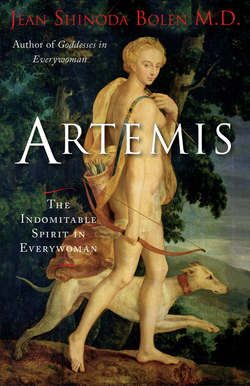Читать книгу Artemis - Jean Shinoda Bolen - Страница 24
На сайте Литреса книга снята с продажи.
Patriarchal Power
ОглавлениеGreek mythology, like Greek society, was patriarchal. Male gods were powerful and territorial. Their use of power to dominate or rule over others was taken for granted, and men made in their image assumed the same rights. In classical Greek mythology, rape was a common theme. Zeus, the chief god of Olympus, tricked, seduced, raped, impregnated, and abandoned the mothers of his many progeny.
Patriarchal systems are always hierarchal, symbolized as a pyramid or mountain, with the most desirable position at the top. Humans, animals, plants, the ocean, and minerals are all exploited and used for the profit and power of those at the top of the mountain. Conflicts and wars are fought over who will occupy the top of the pyramid, with destruction of life, beauty, and hope found in every war zone. Rape is used as a metaphor when applied to cities and to the earth itself; but wherever there is war, women are raped. Today, in the Congo, rape is deliberately used as a means of conducting war. Eve Ensler, returning from the Congo, refers to patriarchy as a “Rape Culture” (In the Body of the World, 2013). This made me think about how Zeus on Mount Olympus, the symbolic progenitor of patriarchy, was a serial rapist.
From archeological evidence, most notably that described by UCLA archeologist Marija Gimbutas (The Goddesses and Gods of Old Europe, 1982), we know that. Europe's first civilization, from 6,500 to 5,000 BCE, was matrifocal, sedentary, and peaceful. Its members created art and worshipped goddesses. Successive waves of invaders from the distant north and east, referred to as Indo-Europeans or Kurgans, conquered these earlier peoples. The invaders were nomadic, horse-riding, warlike tribes who worshipped sky gods. They regarded themselves as superior to the peaceful and more culturally developed people of Old Europe, whom they easily subjugated. Male gods and male superiority came to be assumed as the natural order. In the historical time when Athens became known as the “cradle of democracy,” the right of citizenship was given only to men. Fathers had the power of life or death over their newborn children, which meant that an unwanted daughter or a defective infant could be disposed of, and a daughter who lost her virginity could be sold into slavery.
Not much has changed in some parts of the world. There are still places where a young daughter can be sold into marriage to a much older man who may already have several wives. The prospective husband and her father merely agree upon a dowry or bride price. Or a daughter may be sold for an agreed price to a human trafficker who takes her to a brothel. Her virginity must be assured in both instances, as her value depends upon it. Under this code, since a virgin who is raped dishonors the men of her family, a brother, a father, an uncle, or a grandfather has the right to murder her. This awful practice is called “honor killing.” Mothers have no say in the fate of their daughters or, for that matter, in their own fate, since their primary function is to be brood mares. How very different if, instead, these women were mother bears!
In “Sarah Palin, Mama Grizzlies, Carl Jung, and the Power of Archetypes,” Arianna Huffington looked to “that under-appreciated political pundit, Carl Jung” to explain Sarah Palin's appeal (Huffington Post, August 1, 2010). She cites “Mama Grizzlies,” Palin's web video compiled from a series of Palin rallies, with sound-bite responses.
“It seems like it's kind of a mom awakening . . . women are rising up.”
“I always think of the mama grizzly bears that rise up on their hind legs when somebody is coming to attack their cubs.”
Huffington notes that it is not Palin's political positions that people respond to; it's her use of symbols.
Mama grizzles rearing up to protect their young? That's straight out of Jung's “collective unconscious”—the term Jung used to describe the part of the unconscious mind that, unlike the personal unconscious, is shared by all human beings, made up of archetypes, or, in Jung's words, “universal images that have existed since the remotest times.”
When women in India take to the streets to protest official disregard of rape, when women dance in the streets in an outpouring of support for Eve Ensler's One Billion Rising demonstrations to stop violence against women and girls, when the number of nongovernmental organizations (NGOs) working toward empowerment and equality for women and girls grows exponentially, women across the world are rising up, led by feminists for whom Artemis and mother-bear activism are deep sources of meaning, even when these forces are not named. When they are, there is an immediate “aha!” of intuitive recognition, becausee cause these are archetypal energies that are found in many cultures.
